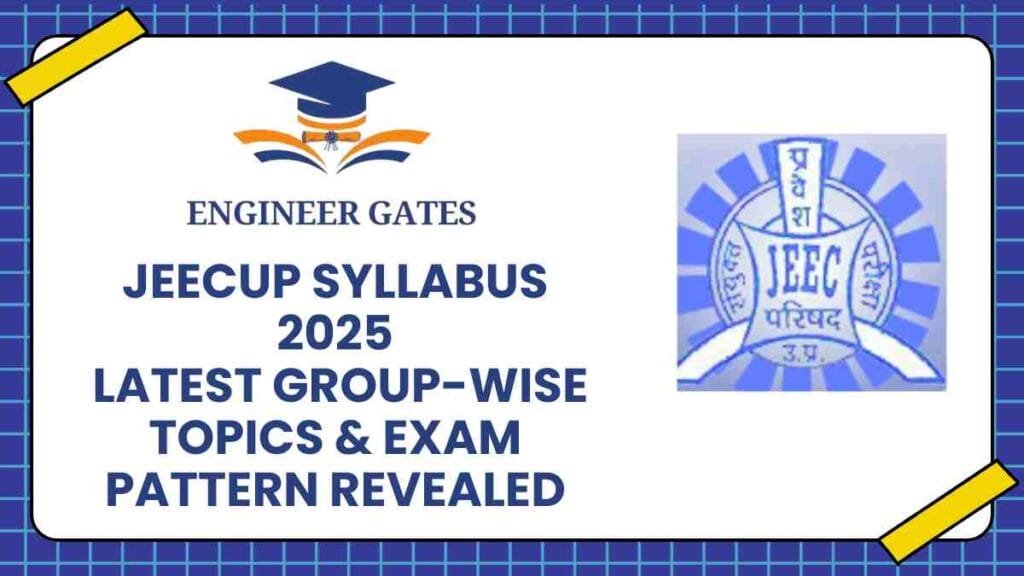Are you planning to write GATE 2026 for Computer Science (CSE)? Then you need to know what to study, how the exam looks, and which topics are most important.
What is GATE and Why is it Important?
GATE means Graduate Aptitude Test in Engineering. It is a big exam in India for engineering students.
Why do students write GATE?
- To get M.Tech or M.E admission in top colleges like IIT, NIT, IIIT.
- To get jobs in government companies (PSUs) like ONGC, BHEL, IOCL.
- Some private companies also like GATE rank students.
- You can also go for higher studies in some foreign universities with GATE score.
So yes, GATE is very important for your career.
Who Can Give GATE 2026?
- If you are in 3rd year, final year, or have completed engineering, you can give GATE.
- There is no age limit.
GATE 2026 Exam Details
- Organized by: IIT Guwahati
- Mode: Online
- Time: 3 hours
- Total Marks: 100
- Total Questions: 65
- Sections:
- General Aptitude – 15 marks
- Engineering Mathematics – about 15 marks
- Computer Science Subjects – about 70 marks
Question Types:
- MCQ (Multiple Choice) – Wrong answer = negative marks
- MSQ (Multiple Select) – No negative marks
- NAT (Numerical Answer) – No negative marks
GATE 2026 Exam Pattern – In Short
- Total 65 questions
- Total 100 marks
- 3 hours only
- General Aptitude = 15 marks
- Engineering Maths = 13 to 15 marks
- CSE Subjects = 70+ marks
GATE 2026 CSE Syllabus – What to Study
The syllabus has 3 main parts:
1. General Aptitude (15 marks)
This is common for all students.
It checks your basic English and maths.
Topics:
- English grammar and reading
- Simple maths like percentages, ratios
- Reasoning and small puzzles
2. Engineering Mathematics (about 15 marks)
Topics are:
- Sets and Logic
- Matrices and Vectors
- Calculus – Differentiation and Integration
- Probability and Statistics – Mean, Median, Probability rules
3. Computer Science Subjects (70 marks)
This is the main part.
Topics:
- Digital Logic – Logic gates, circuits
- Computer Organization – CPU, memory, pipelining
- Programming & Data Structures – Arrays, stacks, queues, linked list, trees, graphs
- Algorithms – Sorting, searching, dynamic programming, graph algorithms
- Theory of Computation – Automata, Turing machine
- Compiler Design – Lexical analysis, parsing
- Operating Systems – Processes, threads, scheduling, deadlocks, memory management
- Databases – SQL, ER diagrams, normalization
- Computer Networks – OSI model, TCP/IP, routing
Expected Weightage for Each Subject
| Subject | Marks |
| General Aptitude | 15 |
| Engineering Maths | 14-15 |
| Programming & Data Structures | 11-Oct |
| Computer Organization | 9 |
| Operating Systems | 9 |
| Algorithms | 8 |
| Computer Networks | 8-Jul |
| Theory of Computation | 8-Jul |
| Databases | 8-Jul |
| Digital Logic | 5 |
| Compiler Design | 3-Feb |
Which Topics to Study First?
Start with topics that give more marks:
- Programming & Data Structures
- Algorithms
- Operating Systems
- Computer Networks
- Databases
- Theory of Computation
- Engineering Mathematics
- General Aptitude
Simple Tips to Prepare for GATE 2026
- Start early – The syllabus is big.
- Make a study plan – Fix time for each subject.
- Focus on important topics first – OS, DBMS, CN, Algorithms.
- Solve previous year papers – This shows real questions.
- Give mock tests – Practice like real exam.
- Clear basics first – Understand, don’t just memorize.
- Make short notes – For last-minute revision.
- Revise daily – Even 30 minutes revision is helpful.
Easy Study Plan
- First 3 months → Complete all topics slowly.
- Next 2 months → Solve previous papers and practice questions.
- Last 1 month → Only revision and mock tests.
Final Words
GATE 2026 is a big exam. But if you study smart and practice daily, you can do it.
- Know the syllabus
- Learn the exam pattern
- Focus on high-weightage topics
- Revise again and again
- Take mock tests
Do this, and success will be yours.
Best of luck for your GATE 2026!


